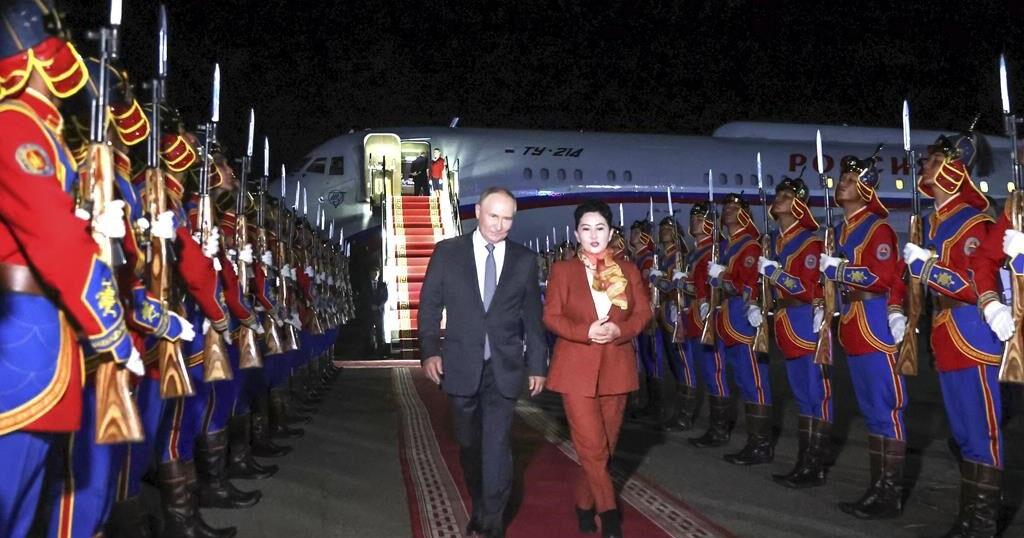ULAANBAATAR, Mongolia (AP) — Russian President Vladimir Putin visited Mongolia on Tuesday with no sign that the host country would bow to calls to arrest him on an international warrant for alleged war crimes stemming from the Russian invasion of Ukraine.
The trip is Putin’s first to a member country of the International Criminal Court since it issued the warrant about 18 months ago. Ahead of his visit, Ukraine called on Mongolia to hand Putin over to the court in The Hague, and the European Union expressed concern that Mongolia might not execute the warrant. A spokesperson for Putin said last week that the Kremlin wasn’t worried.
The warrant puts the Mongolian government in a difficult position. After decades under communism with close ties to the Soviet Union, it transitioned to democracy in the 1990s and has built relations with the United States, Japan and other new partners. But it remains economically dependent on its two much larger and more powerful neighbors, Russia and China. Russia supplies the landlocked country with most of its fuel and a sizeable amount of its electricity.
The ICC has accused Putin of being responsible for the abductions of children from Ukraine, where the fighting has raged for 2 1/2 years. Member countries are required by the court’s founding treaty, the Rome Statute, to detain suspects if an arrest warrant has been issued, but Mongolia needs to maintain good relations with Russia and the court lacks a mechanism to enforce its warrants.
The Russian leader was welcomed in the main square in Ulaanbaatar, the capital, by an honor guard dressed in vivid red and blue uniforms styled on those of the personal guard of 13th century ruler Genghis Khan, the founder of the Mongol Empire.
He and Mongolian President Khurelsukh Ukhnaa walked up the red-carpeted steps of the Government Palace and bowed before a statue of Genghis Khan before entering the building for their meetings.
A small group of protesters who tried to unfurl a Ukrainian flag before the welcome ceremony were taken away by police.
The two governments signed agreements for a feasibility study and the design of an upgrade to a power plant in Ulaanbaatar and to ensure the continuous supply of aviation fuel to Mongolia. Putin also outlined plans to develop the rail system between the two countries.
He invited the Mongolian president to attend a summit of the BRICS nations — a group that includes Russia and China among others — in the Russian city of Kazan in late October. Khurelsukh accepted, according to Russian state news agency RIA Novosti.
On Monday, the EU expressed concern that the ICC warrant might not be executed and said it had shared its concern with Mongolian authorities.
“Mongolia, like all other countries, has the right to develop its international ties according to its own interests,” European Commission spokeswoman Nabila Massrali said. But she added, “Mongolia is a state party to the Rome Statute of the ICC since 2002, with the legal obligations that it entails.”
More than 50 Russians outside the country have signed an open letter urging the government of Mongolia to “immediately detain Vladimir Putin upon his arrival.” The signers include Vladimir Kara-Murza, who was freed from a Russian prison in August in the biggest East-West prisoner swap since the Cold War.
Dmitry Medvedev, the deputy secretary of Russia’s Security Council, denounced the warrant against Putin as “illegal” in an online statement Tuesday and those who would try to carry it out as “madmen.”
Putin, on his first visit to Mongolia in five years, will join a ceremony to mark the 85th anniversary of a joint Soviet and Mongolian victory over Japan’s army that controlled Manchuria in northeast China. Thousands of soldiers on both sides died in 1939 in months of fighting over the border’s location between Manchuria and Mongolia.
“I am very delighted about Putin’s visit to Mongolia,” said Yansanjav Demdendorj, a retired economist, citing Russia’s role against Japan. “If we think of the … battle, it’s Russians who helped free Mongolia.”
Putin has made a series of overseas trips in recent months to try to counter the international isolation he faces over the invasion of Ukraine. He visited China in May, made a trip to North Korea and Vietnam in June and went to Kazhakstan in July for a meeting of the Shanghai Cooperation Organization.
But Kenneth Roth, the former longtime director of Human Rights Watch, described Putin’s trip to Mongolia as “a sign of weakness,” posting on X that the Russian leader “could manage a trip only to a country with a tiny population of 3.4 million that lives in Russia’s shadow.”
Last year, Putin joined a meeting in Johannesburg by video link after the South African government lobbied against him showing up for the BRICS summit. South Africa, an ICC member, was condemned by activists and its main opposition party in 2015 when it didn’t arrest then-Sudanese President Omar al-Bashir during a visit.
Enkhgerel Seded, who studies at a university in Moscow, said that historically, countries with friendly relations don’t arrest heads-of-state on official visits.
“Our country has obligations toward the international community,” she said. “But … I think in this case as well, it would not be appropriate to conduct an arrest.”

























